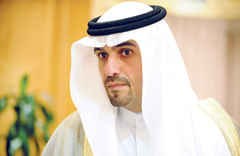 Anas Al-Saleh
Anas Al-SalehKUWAIT: The government is studying whether to raise fees for its services, Finance Minister Anas Al-Saleh said in comments published by the local Al-Rai newspaper yesterday. Saleh said the study was part of a project to rationalize spending, review subsidies and diversify sources of revenue. "It is not intended only to plug the (budget) deficit resulting from low oil prices - it will be permanent whether oil prices continue to drop or increase," Saleh told the newspaper without specifying the fees that might be raised.
He also said that any increase in service fees or gasoline prices would be decided by the Cabinet rather than through parliamentary legislation, but that the Cabinet would consult lawmakers on issues that required legislation, according to Al-Rai. The minister said increasing service fees is a complex issue that needs careful economic and technical studies, adding that the goal is to secure stability, whether oil prices continue to fall or rise.
But the National Assembly's financial and economic affairs committee yesterday told the government that it wants a clear mechanism for the proposed increase in charges on public services and rejected that low income people be targeted by the increase. The committee however kept the door open for serious government proposals in this regard as it began debating a two-decade old law that requires the consent of the Assembly to raise service charges.
Rapporteur of the committee MP Mohammad Al-Jabri said the committee discussed with representatives of the finance ministry the issue of raising service charges and insisted that it rejects any raise without upgrading the level of the services. He said the ministry informed the committee that a specialized company is studying the issue of subsidies provided on around 5,000 commodities and the committee asked the ministry for a copy of the study.
Jabri said the committee is aware that the state is facing a huge budget deficit of around KD 25 billion over the next five years. He said the committee will continue its meetings in order to complete the draft law for raising service charges without providing a specific date. The Assembly passed in early 1990s a law that bans the government from raising service charges without prior approval from the Assembly.
MP Ahmad Al-Qudhaibi said the government focused during the meeting on raising service charges and taxes as a means of meeting the potential budget deficit due to the sharp decline in oil prices. He said that MPs asked the government about its plan to meet the deficit and inquired why the state's main sectors are not participating in the effort. The only measure Kuwait has already taken was to start selling diesel, kerosene and aviation fuel at market prices from the start of 2015.
Saleh told Al-Rai the government will legislate to increase the fees without harming limited-income people, with keenness on maintain their living standards. He stressed on strengthening the principle of rationalization and a sense that the government spends on services that benefit citizens and residents, indicating that an increase of electricity and water fees, for example, will not affect the cash-strapped people.
The government spends heavily on subsidizing domestic gasoline prices; raising prices could save it large amounts of money, but would be politically sensitive and might attract criticism in parliament. Saleh had previously said Kuwait, which has huge financial reserves, was considering various options to cover the deficit, including steps to save money as well as bond issues.
Meanwhile, the Assembly's educational committee reviewed the controversial electronic media law. Its rapporteur MP Humoud Al-Hamdan said that the committee found that many of the law's provisions require fundamental changes, especially those related to freedom and awarding of licenses. He said the law can be evaluated in a comprehensive way once all its articles and proposals to amend them are reviewed.
Qudhaibi meanwhile said he will demand that the report of the investigation committee on the controversial Dow project be returned to the committee because it is incomplete. The report was supposed to have been debated in the Assembly last week but due to shortage of time, the report is now expected to be debated early next month.
The lawmaker said that the investigation committee had refused to include the opinions of some former senior officials from the oil sector who offered to testify in the probe, but their offers were turned down. As a result, the report is incomplete and should be returned to the committee to complete it. The committee investigated why Kuwait scrapped in 2008 a multibillion-dollar joint venture with US' Dow Chemical and as a result was ordered to pay a fine of $2.2 billion. Kuwait immediately paid the fine and the committee is also investigating the reason for rushing the payment.
By B Izzak and Agencies










